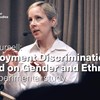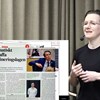discriminative
How and why do we discriminate?
At last Friday’s research seminarKatrin Ausprung from the Department of History and Sociology at Konstanz University in Germany came to talk to us about her reserach on discrimination in housing marke
Harm and Discrimination
Ethical Theory and Moral Practice, 22, 873–891. doi:10.1007/s10677-018-9908-4 Abstract Many legal, social, and medical theorists and practitioners, as well as lay people, seem to be concerned with the h
Implicit Bias and Discrimination
Theoria, Early View, pp. 1-22. https://doi.org/10.1111/theo.12227 Abstract Recent social‐psychological research suggests that a considerable amount of, for example, racial and gendered discrimination may
Age Discrimination: Is It Special? Is it Wrong?
In Bognar, G & A. Gosseries (red.) Ageing without Ageism? Conceptual Puzzles and Policy Proposals. Oxford Academic. Abstract This chapter examines the moral status of age discrimination by bringing t
Discrimination and Future Generations
In: Mosquera, J. & O. Torpman (ed.),Studies on Climate Ethics and Future Generations vol. 6. Working Paper Series 2024:10–17 Abstract In this paper, I analyse whether the present generation’s choices. This has been tentatively suggested in both legal theory and philosophy; I review such suggestions briefly in section 1. However, a more rigorous analysis – outlining the concept, relevant grounds, and wrong-making features of discrimination, and applying these to future generations – is still lacking. To address this lacuna, I propose a theory of discrimination and analyse why it might seem to apply – yet ultimately fails to apply – to the differential treatment of future generations. More specifically, I propose a definition of discrimination (section 2.1) and an account of the moral wrongness of discrimination (section 2.2). I moreover explore the connection between discrimination and theories of social (in)justice (section 2.3). I then apply this theory to the problem of differential treatment of future generations. While discrimination may occur between collectives, such as generations (section 3.1), my analysis shows that the specific temporal status of future generations is not comparable to other grounds of discrimination, such as gender or race (section 3.2). Moreover, due the non-identity problem and the problem of lack of a “community of social meaning” between generations, future generations cannot be claimed to be subjected to worse treatment by the present generation (section 3.3). Hence, their differential treatment due to the present generation’s choices does not amount to discrimination. Section 4 concludes and outlines some upshots of my analysis.
Completed: Harm and discrimination
What is it that makes discrimination wrong? We examine the concept of harm and its philosophical relevance, as well as the role it plays in discrimination.

Gunn Birkelund: Gender discrimination in hiring
Gunn Elisabeth Birkelund, PhD in Sociology is Professor of Sociology in the Department of Sociology and Human Geography at the University of Oslo (since 1999). Her main publications cover labour marke

Employment Discrimination Based on Gender and Ethnicity
The study contributes to knowledge about the process behind gender segregation in the labor market. Segregation may be seen as generated by the combined outcome of decisions located at the supply side
Katharina Berndt Rasmussen: Bridging Gaps - A Theory of Discrimination
Venue: Institutet för framtidsstudier, Holländargatan 13, 4th floor, Stockholm, or online. Research seminar with Katharina Berndt Rasmussen, PhD. in Philosophy.Register here >Abstract Disputes about d

Katharina Berndt Rasmussen: Bridging Gaps - A Theory of Discrimination
Research seminar with Katharina Berndt Rasmussen, PhD. in Philosophy. Disputes about discrimination surface time and again in the public debate: Is there such a thing as ”reverse discrimination” or ”S








